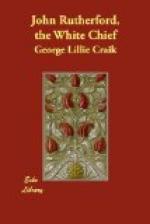The labours of agriculture in New Zealand are, in this way, rendered exceedingly toilsome, by the imperfection of the only instruments which the natives possess. Hence, principally, their extreme desire for iron. Marsden, in the “Journal of his Second Visit,” gives us some very interesting details touching the anxiety which the chiefs universally manifested to obtain agricultural tools of this metal. One morning, he tells us, a number of them arrived at the settlement, some having come twenty, others fifty miles. “They were ready to tear us to pieces,” says he, “for hoes and axes. One of them said his heart would burst if he did not get a hoe.”
They were told that a supply had been written for to England; but “they replied that many of them would be in their graves before the ship would come from England, and the hoes and axes would be of no advantage to them when dead. They wanted them now. They had no tools at present, but wooden ones to work their potato-grounds with; and requested that we would relieve their present distress.”
When he returned from his visit to Shukehanga, many of the natives of that part of the country followed him, with a similar object, to the settlement. “When we left Patuona’s village,” says he, “we were more than fifty in number, most of them going for an axe or a hoe, or some small edge-tool. They would have to travel, by land and water, from a hundred to a hundred and forty miles, in some of the worst paths, through woods, that can be conceived, and to carry their provisions for their journey. A chief’s wife came with us all the way, and I believe her load would not be less than one hundred pounds; and many carried much more.” But, perhaps, the most importunate pleader the reverend gentleman encountered on this journey was an old chief, with a very long beard, and his face tattooed all over, who followed him during part of his progress among the villages of the western coast. “He wanted an axe,” says Marsden, “very much; and at last he said that if we would give him an axe, he would give us his head. Nothing is held in so much veneration by the natives as the head of their chief. I asked him who should have the axe when I had got his head. At length he said, ’Perhaps you will trust me a little time; and, when I die, you shall have my head.’ This venerable personage afterwards got his axe by sending a man for it to the settlement.”
FOOTNOTES:
[Footnote AD: Probably Nene.]
[Footnote AE: There is no “l” in the Maori orthography, and the name cannot be traced.]
[Footnote AF: This is another case where Rutherford’s pronunciation seems to have been at fault.]
[Footnote AG: The taro.]
[Footnote AH: The kumera, a sweet potato, which was extensively cultivated by the ancient Maoris.]
[Footnote AI: “Haere mai,” “come here,” the usual words of welcome.]




